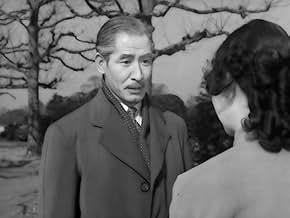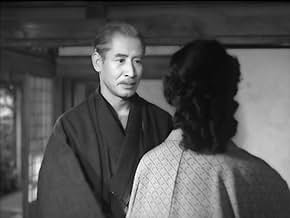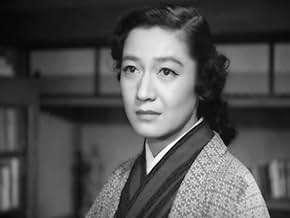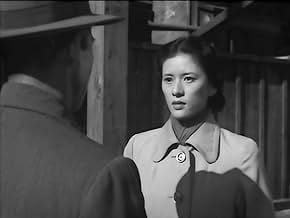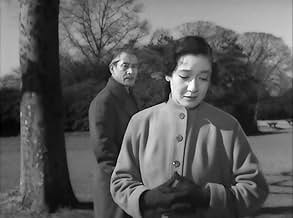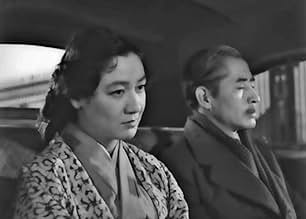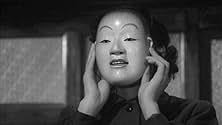CALIFICACIÓN DE IMDb
7.7/10
2.3 k
TU CALIFICACIÓN
Agrega una trama en tu idiomaAn ingratiating bride develops warm ties to her father-in-law while her cold husband blithely slights her for another woman.An ingratiating bride develops warm ties to her father-in-law while her cold husband blithely slights her for another woman.An ingratiating bride develops warm ties to her father-in-law while her cold husband blithely slights her for another woman.
- Premios
- 1 premio ganado y 1 nominación en total
- Dirección
- Guionistas
- Todo el elenco y el equipo
- Producción, taquilla y más en IMDbPro
Opiniones destacadas
The businessman Ogata Shingo (Sô Yamamura) works with his son Shuichi (Ken Uehara), who is his secretary, and they live together in the suburb with their wives Yasuko (Teruko Nagaoka) and Kikuko (Setsuko Hara) respectively. Shuichi has a love affair and has a loveless marriage with Kikuko. Yasuko has dedicated her entire life to her family but Shingo married her only because her older sister had died. Kikuko is the pride and joy of Shingo and they are close to each other.
Out of the blue, Shingo and Yasuko's daughter Fusako (Chieko Nakakita) leaves her husband and arrives at Shingo's home with her two children. Shingo investigates and finds the address of Shuichi's lover. Meanwhile Kikuko goes to the hospital and Shingo learns that she was pregnant but decided to abort her child.
"Yama no oto" is a movie about forbidden love based on the novel of Yasumari Kawabata and directed by Mikio Naruse that uses the favorite theme of Ozu – the family drama - and similar locations. The story is based on the patriarch Shingo, a man that has married his wife without loving her but also respected her along their lives. He feels a forbidden love with his sister-in-law Kikuko, a woman that is apparently submissive working as a servant at home, but strong enough to abort her child to avoid keeping her loveless marriage with her husband. Fusako is Shingo's estranged daughter that is also strong enough to leave her husband and move with her children to her parents' home. This women behavior is unusual in Japanese movies from these years. My vote is eight.
Title (Brazil): "O Som da Montanha" ("The Sound of the Mountain")
Out of the blue, Shingo and Yasuko's daughter Fusako (Chieko Nakakita) leaves her husband and arrives at Shingo's home with her two children. Shingo investigates and finds the address of Shuichi's lover. Meanwhile Kikuko goes to the hospital and Shingo learns that she was pregnant but decided to abort her child.
"Yama no oto" is a movie about forbidden love based on the novel of Yasumari Kawabata and directed by Mikio Naruse that uses the favorite theme of Ozu – the family drama - and similar locations. The story is based on the patriarch Shingo, a man that has married his wife without loving her but also respected her along their lives. He feels a forbidden love with his sister-in-law Kikuko, a woman that is apparently submissive working as a servant at home, but strong enough to abort her child to avoid keeping her loveless marriage with her husband. Fusako is Shingo's estranged daughter that is also strong enough to leave her husband and move with her children to her parents' home. This women behavior is unusual in Japanese movies from these years. My vote is eight.
Title (Brazil): "O Som da Montanha" ("The Sound of the Mountain")
The team of Hara, Kawabata, Naruse, and Uehara is back with another inconsistent, too long film about marital (and other) woes. When it's focusing on the love affair between the elderly father, wonderfully played by So Imamura, and his young, child like daughter in law, affectingly portrayed, as usual, by Setsuko H, the film can stand comparison with the master of heartbreaking, Japanese family drama, Ozu. However, when it wanders off into side stories, like the one about the son's mistress and the mistress' room mate, things can, frankly, get a bit dull. Give it a B minus. PS...It's a long time coming but that last scene in a Tokyo park is a real ticker tugger.
I'm well aware that Mikio Naruse is one of those holy cows of film history. Criticising him is some kind of blasphemy.
And yet I'll gladly die painfully on this hill: Every single one of his movies is terrible out of principle.
I've you've seen one Naruse, you've seen them all because there is literally nothing to it. Every single story - this one included - is basically about a ridiculously noble, self-pitying, suffering woman in a world where virtually every man is a smug, condescending parody of a man.
Women always have the moral highground and the whole thing is nothing but a mawkish didactic-play with the depth of a sunday morning cartoon.
It's redundand to say anything about his laughable radical feminism and I want my review to finally get through.
Again, his movies are objectively bad, people just don't (want to) see it because we live in objectively bad times.
And yet I'll gladly die painfully on this hill: Every single one of his movies is terrible out of principle.
I've you've seen one Naruse, you've seen them all because there is literally nothing to it. Every single story - this one included - is basically about a ridiculously noble, self-pitying, suffering woman in a world where virtually every man is a smug, condescending parody of a man.
Women always have the moral highground and the whole thing is nothing but a mawkish didactic-play with the depth of a sunday morning cartoon.
It's redundand to say anything about his laughable radical feminism and I want my review to finally get through.
Again, his movies are objectively bad, people just don't (want to) see it because we live in objectively bad times.
An honest look at marriage, adultery, divorce, and abortion, especially refreshing for 1954, and with the emotions between an elderly man (So Yamamura) and his daughter-in-law (Setsuko Hara) poignantly rendered. His son / her husband (Ken Uehara) is a real piece of work, brazenly carrying on with other women, staying out late, and getting physically abusive when they don't do as he wishes (referred to, not shown). Meanwhile the man's daughter is also in a broken marriage, returning home with her two children because her husband's cheating on her. The film calls out bad male behavior by showing its impact, and the conversations between characters feels fairly modern.
One of the things altered relative to Yasunari Kawabata's novel is the elderly man's mental state, which in this adaptation isn't declining with age, with accompanying melancholy. Another is his relationship with his daughter-in-law; clearly they have a connection in the film, but it's based on simple kindness and admiration, and erotic feelings on his part aren't involved. The result is a character who is on the surface a decent old man, still married to his own wife despite his own indiscretions and having been more attracted to her older sister long ago. He's not particularly effective in reining in his son, however, and he doesn't give his own daughter enough affection or attention, reserving those things for his daughter-in-law. In that sense he's failed in life.
As in many of her films, Setsuko Hara is the brightest light in the cast. Her character is simple, kind, and filial (derisively referred to as "childlike" by her husband), but shows a toughness in the actions she takes. Hara brings out the emotions very well, and while the ending gets a little melodramatic, it has power. Overall, just a very well done, well-paced film from Mikio Naruse.
One of the things altered relative to Yasunari Kawabata's novel is the elderly man's mental state, which in this adaptation isn't declining with age, with accompanying melancholy. Another is his relationship with his daughter-in-law; clearly they have a connection in the film, but it's based on simple kindness and admiration, and erotic feelings on his part aren't involved. The result is a character who is on the surface a decent old man, still married to his own wife despite his own indiscretions and having been more attracted to her older sister long ago. He's not particularly effective in reining in his son, however, and he doesn't give his own daughter enough affection or attention, reserving those things for his daughter-in-law. In that sense he's failed in life.
As in many of her films, Setsuko Hara is the brightest light in the cast. Her character is simple, kind, and filial (derisively referred to as "childlike" by her husband), but shows a toughness in the actions she takes. Hara brings out the emotions very well, and while the ending gets a little melodramatic, it has power. Overall, just a very well done, well-paced film from Mikio Naruse.
(1954) Sound of the Mountain/ Yama no oto
(In Japanese with English subtitles)
DRAMA
Adapted from the novel by Yasunari Kawabata, that plays like Yasujirô Ozu movie starring Setsuko Hara as an already married wife Kikuko Ogata married to a husband Shuichi Ogata (Ken Uehara) who cheats on her at the small token while living with her husbands parents. Kikuko(Haras) interventions with other characters is a backdrop to the relationship between her and her stepfather, Shingo Ogata (Sô Yamamura). AS I had pointed out, this is what Ozu does best and that he should not be the the only director to be making these drama movies when they're others. It is subtle and self-explanatory.
Adapted from the novel by Yasunari Kawabata, that plays like Yasujirô Ozu movie starring Setsuko Hara as an already married wife Kikuko Ogata married to a husband Shuichi Ogata (Ken Uehara) who cheats on her at the small token while living with her husbands parents. Kikuko(Haras) interventions with other characters is a backdrop to the relationship between her and her stepfather, Shingo Ogata (Sô Yamamura). AS I had pointed out, this is what Ozu does best and that he should not be the the only director to be making these drama movies when they're others. It is subtle and self-explanatory.
¿Sabías que…?
- TriviaSô Yamamura, who portrays Shingo the father, was actually one year younger than Ken Uehara, who portrayed his son Shuichi.
- Citas
Fusako Aihara: What do you think, Father? You're busy reading the newspaper. Nobody really cares about my troubles.
Shingo Ogata: I don't know what to say. From the outside, you can never tell what's really going on in a marriage.
Selecciones populares
Inicia sesión para calificar y agrega a la lista de videos para obtener recomendaciones personalizadas
Detalles
- Fecha de lanzamiento
- País de origen
- Idioma
- También se conoce como
- Sound of the Mountain
- Productora
- Ver más créditos de la compañía en IMDbPro
- Tiempo de ejecución1 hora 35 minutos
- Color
- Mezcla de sonido
- Relación de aspecto
- 1.37 : 1
Contribuir a esta página
Sugiere una edición o agrega el contenido que falta

Principales brechas de datos
By what name was Yama no oto (1954) officially released in India in English?
Responda
